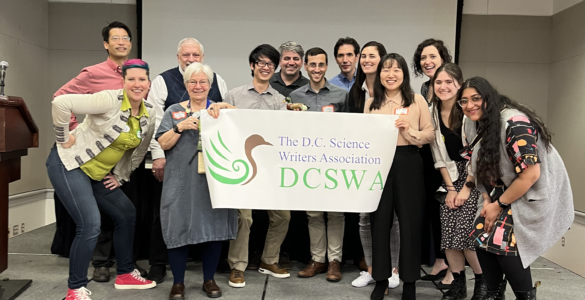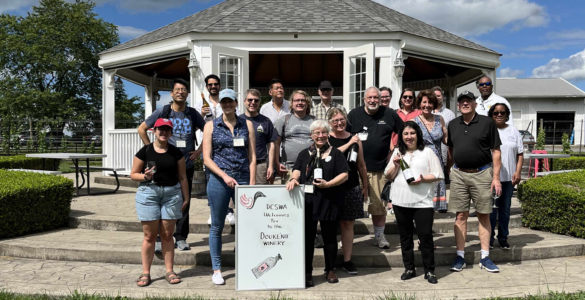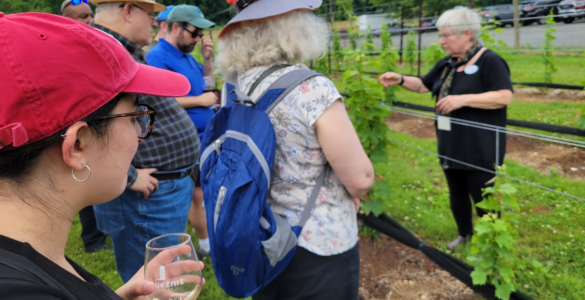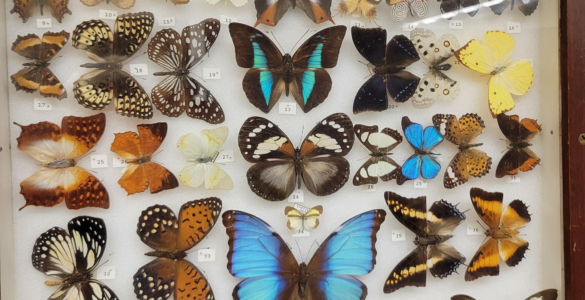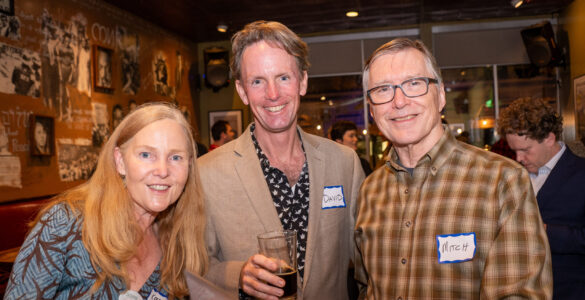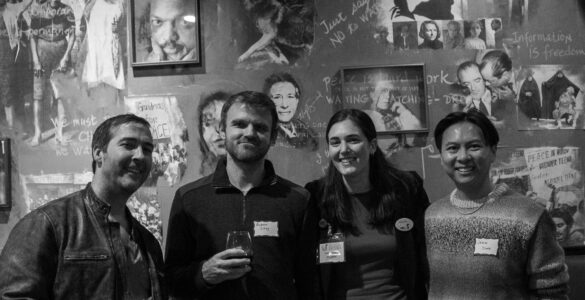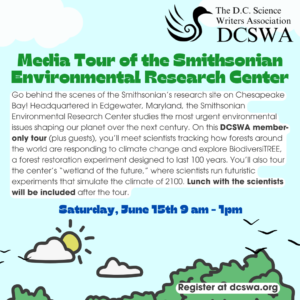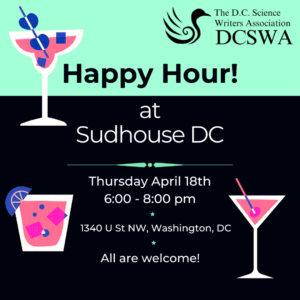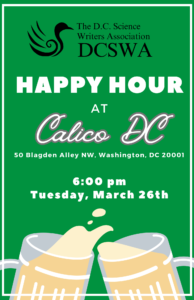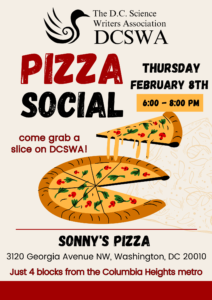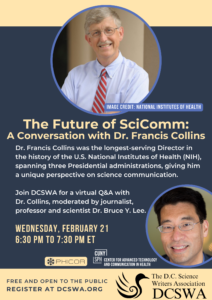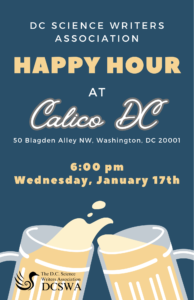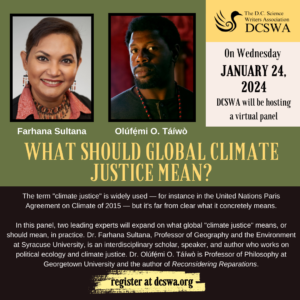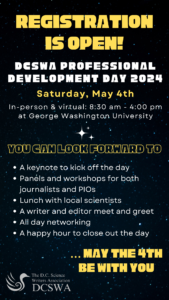 Professional Development Day, a career development event for science writers, has been DCSWA’s signature event since 2006. Every year, over 100 science reporters, PIOs, editors, radio and video producers, and freelancers gather for a fun and exciting day of networking and skill-building
Professional Development Day, a career development event for science writers, has been DCSWA’s signature event since 2006. Every year, over 100 science reporters, PIOs, editors, radio and video producers, and freelancers gather for a fun and exciting day of networking and skill-building
Please join us on Saturday, May 4th, from 8:30 am – 4:00 pm at George Washington University’s Student Center on the 3rd floor.
Our full-day event will include a keynote talk, panel discussions and workshops geared toward both journalists and PIOs, lunch with local scientists, an editor meet and greet, and a happy hour. We will also have live streaming — with dedicated specialist support — for those who want to attend the talk and panel discussions virtually. Coffee, breakfast pastries and lunch will be provided. There will also be an in-person raffle of science books.
We are excited for our slate of programming and hope to see you on May 4th.
|
|
Grand Ballroom, 3rd floor |
Room 309 |
| 8:30 – 9:00 am |
PDD registration and check-in |
Grab some coffee and breakfast pastries before we get started |
|
| 9:00 – 9:30 am |
Opening |
PDD kick-off and Newsbrief Award presentation |
|
| 9:30 – 10:30 am |
Keynote |
Kristi Pullen Fedinick |
|
| 10:45 – 11:45 am |
Breakout #1 |
Innovative Digital Storytelling: PIOs Can Do It Too |
Ethical Use of AI in the Newsroom |
| 11:45 – 1:00 pm |
Lunch |
Catered, with the option to have lunch with a GW scientist |
|
| 1:15 – 2:15 pm |
Breakout #2 |
Writer-Editor Meet and Greet |
PIOs: How to Deliver Perfect Pitches to the News Media |
| 2:30 – 3:30 pm |
Breakout #3 |
Lived Experience in Science Writing Workshop |
Contemplating Launching a Newsletter? Learn From the Pros |
| 3:30 – 4:00 pm |
Closing |
Meet for final remarks and a book raffle |
|
| 4:00 – 6:00 pm |
Happy Hour |
Head to the back patio at Tonic just a couple of blocks away |
|
Keynote
Bending the Arc: Harnessing Data to Steer Policy Toward Justice
Dr. Kristi Pullen Fedinick, Associate Research Professor, Department of Environmental and Occupational Health, Milken Institute School of Public Health, The George Washington University
This keynote will explore the intersection of environmental justice and data-driven policy-making, emphasizing the critical role of community engagement and narrative in shaping equitable outcomes. It will uncover the power of data as both a tool and a storyteller, revealing its potential to drive change while acknowledging the gaps that only human stories can fill.
Dr. Kristi Pullen Fedinick is an Associate Research Professor in the Department of Environmental and Occupational Health of the Milken Institute School of Public Health of the George Washington University. With over 25 years of multidisciplinary research experience, Dr. Pullen Fedinick has worked for the last 15 years at the intersection of science and public policy to advance data-driven, health-protective, community-oriented solutions to environmental problems. Her work has focused on effecting positive change at the local and national levels, where she has used scientific tools to advance protections for people and communities that are disproportionately impacted by environmental degradation. Dr. Pullen Fedinick has authored multiple policy reports and comments, peer-reviewed articles, and served on numerous influential committees of the National Academies of Sciences and the U.S. Environmental Protection Agency (EPA), including appointments to the EPA Chartered Science Advisory Board and a workgroup of the National Environmental Justice Advisory Council on Cumulative Impacts. Dr. Pullen Fedinick has served in leadership positions within several environmental organizations including as the Executive Director of the Center for Earth, Energy, and Democracy and as the inaugural Chief Science Officer of the Natural Resources Defense Council. Dr. Pullen Fedinick holds a bachelor’s degree in biochemistry and molecular biology from the University of Maryland Baltimore County and a Ph.D. in molecular and cell biology with a focus on biochemistry, biophysics, and structural biology from the University of California, Berkeley. She was a Robert Wood Johnson Foundation Health and Society Scholar at the Harvard T. H. Chan School of Public Health.
—
Innovative Digital Storytelling: PIOs Can Do It Too
Tired of writing press releases? Science communication for institutions has expanded to many realms of creative digital content such as short videos, documentaries, social media campaigns, and podcasts. Our panelists will offer examples of their work and discuss how creativity can blossom in institutional communications roles.
Panelists:
Brittany Brown, Director of Digital Communications, NASA
José Garcia, Scriptwriter/Director, National Institute of Standards and Technology
Brandon Levy, Health Communications Specialist, National Institutes of Health
Liz Landau, Astrophysics Multimedia Lead, NASA (Moderator)
—
Ethical Use of AI in the Newsroom
Artificial intelligence (AI) has been a huge topic in the news and other industries over the last year. In this panel, Meghan Ashford-Grooms and Jesse J. Holland will discuss ethical (and unethical) approaches to its use, offer advice to journalists and other science communicators navigating AI and discuss how they see the future of AI in newsrooms. The second half of the session will be open to audience questions.
Panelists:
Meghan Ashford-Grooms, The Washington Post
Jesse J. Holland, Associate Director, School of Media & Public Affairs, The George Washington University
Miriam Fauzia, Science and Medicine Fellow, The Dallas Morning News (Moderator)
—
PIOs: How to Deliver Perfect Pitches to the News Media
If you’re a public information officer, issuing a news release from your organization is only the beginning. For your news item to reach more people, reporters need to cover it for their audiences. Beyond news releases, you may also want to pitch experts from your organization on timely topics. Or you may want to invite researchers to cover your meeting or visit your laboratories. Reporters are inundated daily with pitches, making it highly challenging to get coverage even when you communicate important news in a well-written and timely fashion. On the flip side, excessive or poorly targeted pitches can also damage your relationships with reporters, sometimes permanently. How can your media pitches cut through the noise and more frequently result in coverage of your science news? How can good pitches help you build, not hurt, relationships with reporters? Panelists at this session will share best practices and things to avoid, as well as share success stories and ideas for pitching your news stories in the ever-changing news media landscape. This session is intended for science writers who work as public information officers and for all who are interested in fostering productive relationships between scientific institutions and the news media.
Panelists:
Saugat Bolakhe, Science News
Lisa-Joy Zgorski, National Science Foundation
Michelle Z. Donahue, Smithsonian
Matt Shipman, North Carolina State University
Ben Stein, Managing Editor, Public Affairs Office at National Institute of Standards and Technology (Moderator)
—
Lived Experience in Science Writing Workshop
Description: Whether you are covering the impacts of climate change or the complexities of the human brain, science can easily get personal. Join us for a workshop led by talented writers and creators who cover scientific subjects with which they have lived experience and/or who highlight the lived experience of their sources to bring their stories to life. After meeting the experts, participants will break out into discussion groups to review and brainstorm strategies for communicating science with lived experience in mind.
Panelist-Facilitators:
Marisa G. Franco, PhD, Professor of Psychology, University of Maryland and Freelance author, Platonic: How The Science of Attachment Can Help You Make – and Keep – Friends
Malachi Stewart, Positive Voices podcast
Tei Pearson, Positive Voices podcast
Rosalind Donald, PhD, MA, Professor of Communications, American University, “The Climate Story Gaps Project”
Timmy Broderick, STAT
Judith Lavelle, DCSWA member (Moderator)
—
Contemplating Launching a Newsletter? Learn From the Pros
Newsletters have become a staple for many news organizations, universities, non-profits, podcasts… the list goes on. And now the volatile journalism landscape has left many writers wondering, “should I start a newsletter?” In this panel, attendees will learn how to home in on a topic that will resonate with their audiences, how to set goals, what platform might be the best fit, how to know their newsletter is succeeding, how to launch a newsletter with limited resources, how to launch a newsletter within an organization, and more. Ample time will be left for audience questions.
Panelists:
Isabella Cisneros, NIH IRTA Postbaccalaureate Fellow, freelance science writer
Kathleen Garrigan, Director of Research Communications, The George Washington University
Dorea Reeser, Digital Science Content and Strategy Consultant, Dorea Reeser Consulting
Sarah Zielinski, Science News Explores
Sam Jones, Executive Producer, Tiny Matters podcast (Moderator)

